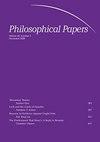关于自由民主稳定性的几点思考
IF 1.3
3区 哲学
0 PHILOSOPHY
引用次数: 0
摘要
抽象自由民主通常被认为是不稳定的,由两个明显不同的理想(即自由主义和民主)组成,它们仍然处于紧张状态。然而,关于所谓自由民主不稳定的论点本身是模棱两可的,因为它可能指的是两种不稳定感:经验的或概念的。在介绍了这一点之后,在我们看来,重要的区别(尽管在相关文献中被忽视了,因为“稳定”的两种含义通常是混淆的),我们认为,虽然自由民主在经验上确实是不稳定的,但与隐含的主导意见相反,它在概念上是稳定的。在论文的第一部分,我们介绍了支持本文的几个论点,即自由民主的概念稳定性;这些论点符合(宪法)预承诺、内在平等和自由的理念。在第二部分中,我们为自由民主的经验不稳定性的说法提供了论据,确定了其主要原因,即人类学的几种心理倾向,特别是自由倾向的弱点、等级倾向和采用极端规范信念的倾向。本文章由计算机程序翻译,如有差异,请以英文原文为准。
Some Reflections on the Stability of Liberal Democracy
Abstract Liberal democracy is often considered to be unstable, consisting of two markedly different ideals (i.e., liberalism and democracy) that remain in tension. Yet the thesis regarding the alleged instability of liberal democracy is itself ambiguous, for it may refer to two senses of instability: empirical or conceptual. After introducing this, in our view, important distinction (though overlooked in the relevant literature where both senses of ‘stability’ are usually mixed up) we argue that while liberal democracy is indeed empirically unstable, it is, contrary to the implicitly assumed dominant opinion, conceptually stable. In the first part of the paper, we introduce several arguments supporting the thesis about the conceptual stability of liberal democracy; the arguments appeal to the ideas of the (constitutional) precommitment, intrinsic equality, and liberty. In the second part, we provide arguments for the claim about the empirical instability of liberal democracy, identifying its main causes, viz. several anthropological-psychological propensities, in particular the weakness of the propensity for freedom, hierarchical proclivities, and inclinations to adopt extreme normative convictions.
求助全文
通过发布文献求助,成功后即可免费获取论文全文。
去求助
来源期刊

Philosophical Papers
PHILOSOPHY-
CiteScore
2.10
自引率
0.00%
发文量
18
期刊介绍:
Philosophical Papers is an international, generalist journal of philosophy edited in South Africa Original Articles: Articles appearing in regular issues are original, high-quality, and stand-alone, and are written for the general professional philosopher. Submissions are welcome in any area of philosophy and undergo a process of peer review based on initial editor screening and refereeing by (usually) two referees. Special Issues: Topic-based special issues are comprised of both invited and submitted papers selected by guest editors. Recent special issues have included ''Philosophy''s Therapeutic Potential'' (2014, editor Dylan Futter); ''Aging and the Elderly'' (2012, editors Tom Martin and Samantha Vice); ''The Problem of the Criterion'' (2011, editor Mark Nelson); ''Retributive Emotions'' (2010, editor Lucy Allais); ‘Rape and its Meaning/s’ (2009, editor Louise du Toit). Calls for papers for upcoming special issues can be found here. Ideas for future special issues are welcome.
 求助内容:
求助内容: 应助结果提醒方式:
应助结果提醒方式:


